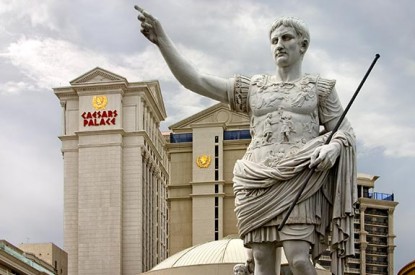Supplier News
US – Caesars’ mergers questioned by shareholder rights attorneys
By Phil - 5 January 2015
Caesars Entertainment and Caesars Acquisition Company have entered into a definitive agreement to merge in an all-stock transaction.
The merged company will be one of the largest gaming and entertainment companies in the world. Upon completion of the merger and the proposed restructuring of Caesars Entertainment Operating Company, the merged company will be well capitalized and positioned for sustainable long-term growth and value creation.
Upon the completion of the transaction, Caesars Entertainment will own a collection of high-growth assets, including properties in destination markets and a majority stake in Caesars Interactive Entertainment, and will operate a valuable network of domestic and international resorts and casinos.
The merged company will be the preeminent gaming and hospitality company in Las Vegas. It will operate Caesars Palace and own 11 properties there, including nine casino resorts and the LINQ promenade and High Roller observation wheel.
The merged company will also own CIE, Harrah’s New Orleans, Harrah’s Atlantic City, Harrah’s Laughlin and Caesars Acquisition’s current equity interest in Horseshoe Baltimore. All of the company’s properties will remain connected via the Total Rewards loyalty network.
The planned merger of Caesars Entertainment and Caesars Acquisition will also support the proposed restructuring of CEOC, a subsidiary of Caesars Entertainment. CEOC announced on December 19, 2014, that it and Caesars Entertainment had reached an agreement with CEOC’s first lien noteholder steering committee regarding the terms of a comprehensive financial restructuring plan that will substantially reduce debt and lower interest payments. The successful completion of the merger will position the merged company to support the restructuring of CEOC without the need for any significant outside financing. The strength of the merged company will position it to be a strong guarantor for the restructured CEOC’s obligations, including lease payments its “OpCo” subsidiary will make to “PropCo.”
Gary Loveman, Chairman and Chief Executive Officer of Caesars Entertainment, said: “The merger of Caesars Entertainment and Caesars Acquisition solidifies our focus on owning assets in destination and high-growth markets and businesses, while maintaining the benefits of operating our network and the Total Rewards loyalty program. Upon completion of the merger and restructuring, Caesars Entertainment Corp. entities will be financially strong, with significantly reduced leverage and a much simpler and straightforward corporate structure.”
On a pro-forma basis, the merged company will have a combined market capitalization of $3.2bn, based on closing prices on December 19, 2014. The merged company will have a combined cash balance of $1.7bn. As of September 30, 2014, Caesars Growth Partners, had approximately $1bn of cash and net leverage of 3.2x.
The merged company will continue to be controlled by affiliates of Apollo Global Management and TPG Capital. Based on each of the company’s records, approximately 90% of the stockholders of Caesars Entertainment also own shares of Caesars Acquisition, and vice versa, implying significant overlap in the stockholders of the two companies.
Mr. Loveman will be Chairman and CEO of the combined company and has agreed to a new employment agreement that extends his tenure until the end of 2016. He will oversee the restructuring of CEOC and continue to focus on recruiting senior talent to Caesars. Mitch Garber, CEO of Caesars Acquisition, will be CEO of CIE. Following the merger, Garber will join the Board of Directors of Caesars Entertainment as Vice Chairman and will assume an expanded leadership role on a project-specific basis across the Company.
Caesars has also reached an agreement with CEOC’s first lien noteholder steering committee regarding terms of a financial restructuring plan. The proposed plan will significantly reduce long-term debt and annual interest payments, and result in a stronger balance sheet for CEOC.
The restructuring support agreement has been signed by all members of the first lien noteholder steering committee.
“The planned restructuring of CEOC will allow us to establish a strong and sustainable capital structure for CEOC and maximize value for our stakeholders,” said Mr. Loveman. “I want to thank this creditor group for its support of the restructuring. We believe the financial restructuring plan we are announcing today is in the best interests of all of CEOC’s stakeholders. We look forward to continuing to welcome guests across our network throughout this process. Business operations at all properties and the Total Rewards program will continue as usual throughout the balance sheet restructuring process.”
To implement the balance sheet deleveraging, CEOC expects to voluntarily commence a reorganization under Chapter 11 of the U.S. Bankruptcy Code in mid-January 2015. CEOC and its properties will continue to operate in the ordinary course throughout the restructuring process. Caesars Entertainment, Caesars Entertainment Resort Properties and Caesars Growth Partners, which are separate entities with independent debt capital structures, will not be part of the court-supervised process.
Under the terms of the proposed financial restructuring, CEOC will convert its corporate structure by separating virtually all of its US-based gaming operating assets and real property assets into two companies, including an operating entity and a newly formed, publicly traded real estate investment trust (“REIT”) that will directly or indirectly own a newly formed property company.
The proposed transactions would reduce CEOC’s debt by approximately $10bn, providing for the exchange of approximately$18.4bn of outstanding debt for $8.6bn of new debt. Annual interest expense would be reduced by approximately 75 per cent, from approximately $1.7bn to approximately $450m. PropCo would lease its real property assets to OpCo in exchange for annual lease payments of $635m, with the lease payments guaranteed by CEC.
“The highly efficient REIT structure would enable CEOC to maximize its value and provide the most financial recovery to each of CEOC’s creditor groups,” Mr. Loveman said. “The formation of a publicly traded REIT would also allow CEOC to significantly reduce its leverage by creating two better capitalized companies with vastly improved cash flow generation. The transaction provides for the continued integration of CEOC’s existing properties with Caesars Entertainment’s multi-channel distribution network and industry-leading Total Rewards loyalty program. Combined, these actions will result in a stronger, more competitive and sustainable CEOC and will better position Caesars Entertainment for future growth, investment and success.”
Caesars said the proposed restructuring plan has the support of all members of the first lien bondholder steering committee. CEOC is continuing to work to obtain additional support from its other creditors.
The specifics of the plan are consistent with the plan disclosed via 8-K on December 12, 2014, however, to further reduce the leverage of CEOC beyond the previously published plan, first lien note holders will have the right to backstop the issuance of $300 million convertible preferred equity securities to be issued by PropCo. First lien holders who agree to backstop the purchase will be paid a commitment fee. The preferred shares will be convertible into PropCo common stock at plan value. First lien holders who sign the restructuring support by December 24, 2014 can join the backstop.
Under the plan, Caesars Entertainment will contribute up to $1.45bn in cash to CEOC in support of the restructuring: $700m to offer to purchase up to 100 per cent of the equity in OpCo from creditors, $269 million to offer to purchase up to 15 per cent of the equity in PropCo, $406m to fund liquidity and cash recoveries to creditors and a guarantee of up to an additional $75m of cash, which can be drawn by CEOC under certain circumstances.
The deals haven’t been welcomed by everyone. Shareholder rights attorneys at Robbins Arroyo LLP are investigating the proposed acquisition of Caesars Acquisition by Caesars Entertainment, asking whether the board of directors at Caesars Acquisition is undertaking a fair process to obtain maximum value and adequately compensate its shareholders.
As an initial matter, the $8.96 merger consideration represents a discount of 13.9 per cent based on Caesars Acquisition’s closing price on December 19, 2014. This discount is significantly below the median one month premium of nearly 45.8 per cent for comparable transactions within the past five years.
On November 10, 2014, Caesars Acquisition released its earnings results for its third quarter 2014, reporting strong quarterly earnings. Total net revenues for the third quarter fiscal 2014 were $485.8m, compared with $325.8mfor the comparable quarter in fiscal 2013, representing 49.1 per cent year-over-year growth. Adjusted earnings before interest, taxes, depreciation, and amortization for the third quarter fiscal 2014 were $105.4m, compared with $78.7m for the comparable quarter in fiscal 2013, representing 74.5 per cent year-over-year growth.
Caesars Acquisition Chief Executive Officer Mitch Garber remarked: “Caesars Growth Partners, LLC reported another solid quarter of results driven by year over year growth in both of our operating segments. Our Interactive Entertainment business continues to deliver impressive results, primarily from our market leading social and mobile games business…. Overall, we are confident that our strategy of developing new projects in key markets and investing capital to expand and enhance our existing casino and interactive portfolio will drive growth and solid operating results for CGP.”
In light of these facts, Robbins Arroyo LLP is examining Caesars Acquisition’s board of directors’ decision to sell the company now rather than allow shareholders to continue to participate in the company’s continued success and future growth prospects.
Caesars Acquisition shareholders have the option to file a class action lawsuit to ensure the board of directors obtains the best possible price for shareholders and the disclosure of material information.



